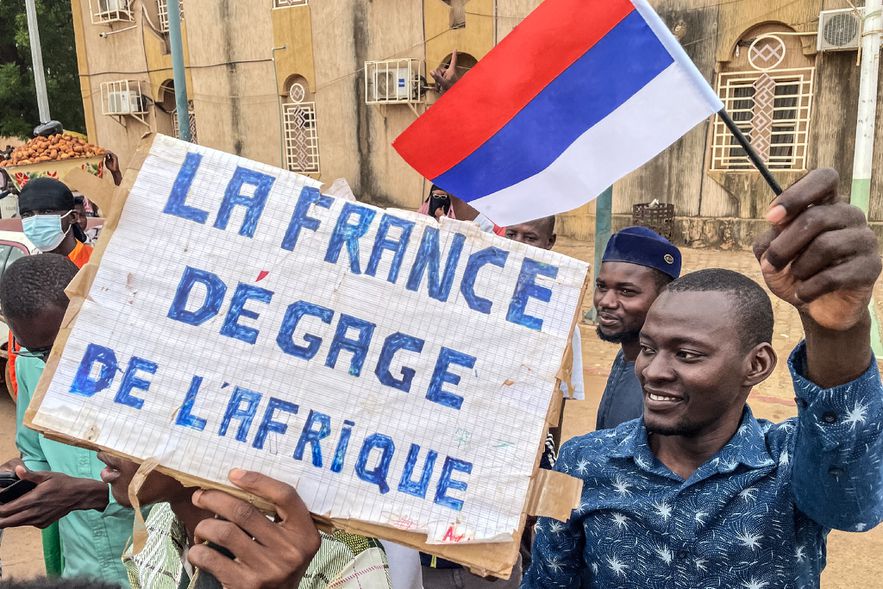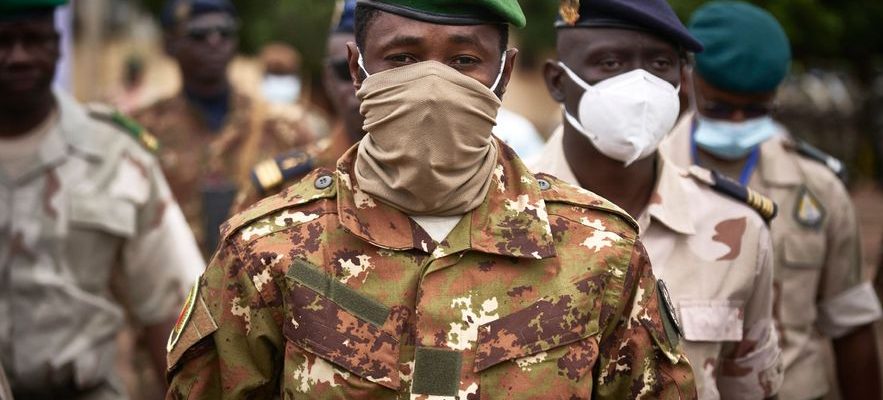After a resounding military coup at the end of July, which resulted in the dismissal of the current president, Mohamed Bazoum, the junta still excludes any return to the past. A blockage that could lead to a bloody confrontation in the Sahelian strip. The countries of the Economic Community of West African States (ECOWAS), led by Nigeria, have also threatened the mutineers with military intervention in the event of no return to democratic order in the country. before Sunday. Their fear? Let this new coup – after the previous ones in Mali, Burkina Faso and Guinea – precipitate the region into a putschist spiral. Director of research at the CNRS and associate professor at the Abdou Moumouni University in Niamey, the Franco-Nigerian Jean-Pierre Olivier de Sardan analyzes the springs of this seditious resurgence in West Africa.
Behind the arguments put forward by the junta, what are the real reasons for this coup in Niger?
Jean-Pierre Olivier de Sardan The putschists justified their action by a “deterioration of the security situation” and “poor economic and social governance”, but this seems to have been improvised a posteriori. This justification is all the less convincing as these soldiers were part of the circles of power. Therefore, the most plausible explanation is that this coup was the result of a form of opportunism on the part of General Tchiani, who wanted to seize power for his personal interest. Then, everything changed when the Chief of Staff joined the putschists, in the name of a caste interest: that of the high military hierarchy, which prevailed over the interest of the country. All this played out between a number of senior officers and the discussions turned in favor of the mutineers.
Mali, Burkina Faso, Guinea… How can this resurgence of military coups in the Sahelian region in recent years be explained?
There are, in my opinion, four main reasons. First, the crisis of democracy in the Sahelian region. In this area, the democratic regimes were the result of a struggle by students and trade unions in the late 1980s and early 1990s, against the military and one-party regimes, which had taken power after the independence. But democracy has greatly disappointed the hopes that had been placed in it, by not succeeding in fundamentally improving the situation of these countries.
Moreover, the political elites gave the impression of only being interested in themselves, which the rigging of certain elections and the very strong business of the ruling class did not help. So today, democracy is going very badly in Africa. Over time, it ended up becoming unpopular and considered illegitimate by part of the population. A curious nostalgia for military or one-party regimes has developed, saying that “at the time the state was more solid and that it worked better”. From then on, this naturally facilitated the shift of certain countries towards military regimes.
The head of the ruling junta in Mali, Colonel Assimi Goïta, on September 18, 2020 in Bamako
© / afp.com/MICHELE CATTANI
Did Westerners also play a role in this shift?
The crisis in relations with Western countries – and France in particular – is indeed the second element, insofar as this has fueled the crisis of democracy. In a way, the accounts of colonization have never really been settled. Françafrique has fueled a feeling of distrust, as have the clumsiness of successive French presidents, who have sometimes shown arrogance and smugness towards African countries. This attitude, which may also have been that of the United States or certain European countries, contributed to the development of anti-Westernism on the African continent. The continuing lessons of democracy from Westerners have been felt as a form of humiliation and have led to this political regime being perceived as being imposed by the West. Moreover, the fact that Westerners criticize the attacks on democracy in Africa, while sympathizing with certain dictators around the world, was perceived as hypocritical.
What other causes have you identified to explain this resurgence of coups?
There are two left. Already, the fact that the national armies of the countries of the region are in deep crisis: they have become one of the most corrupt components of these States and have proved incapable of facing up to the challenges facing them, such as the advancement of jihadism. In addition, there is a putschist culture among senior officers. A putsch is always on the horizon and, when it succeeds, it is the assurance of hitting the jackpot: power, enrichment and reputation, in particular. Finally, the last element to understand this resurgence of coups d’etat is the impact of the jihadist insurrection, which has been attributed to a weakness of democracies. The soldiers therefore seized this opportunity to present themselves as an alternative, capable of doing better, even though they were the ones who failed to prevent the progress of the jihadists.
What impact can this new coup have on the fight against jihadism in the region?
This can only be negative, a fortiori if we refer to what happened in neighboring countries. Since the military took power in Mali, the junta has not stopped publishing bulletins boasting of its victories, even though all the statistics from independent observatories show that the jihadists have made progress. And the same is true in Burkina Faso. Overall, there is a huge contrast between the assertions of the juntas, in terms of the fight against jihadism, and the reality of the facts on the ground.
It is therefore to be feared that Niger will follow the same trend. It is all the more regrettable that Niger found itself in a less degraded position than that of Mali or Burkina: President Bazoum was trying to pacify the political life of the country, which really needed it, and was going in the right direction. from a security point of view, with an improvement in the situation. But overnight, he was removed from power. Finally, the jihadists must rub their hands. All this gives the feeling of a huge mess.
Can France maintain a military presence in Niger?
France will only be able to stay if we want her to. For this, the French leaders would have to show more discernment in their declarations. When, this week, Paris “welcomed” the decisions taken by the leaders of ECOWAS, who threatened to intervene militarily to restore President Bazoum, many Nigeriens reacted by saying that this organization was “under the orders” of the France, even if it is completely false. France must therefore be careful not to shoot itself in the foot. In any case, if she recalls her troops, we can expect Wagner to fill the void. For the moment, the Nigerien junta does not have direct contact with the militia of Prigojine, but it could be quickly. And as in Mali, this will not be for the benefit of the populations.
Is anti-French sentiment growing in Niger?
It already existed before this coup, but it has been reinforced. For part of society, this putsch was seen as an opportunity to put an end to the French presence in the country. And since the military has little other horizon to offer than to reinforce Nigerien nationalism, it can be expected that this will fuel anti-French sentiment. Moreover, there is a lot of false information circulating. For example, it is not true that “the immense resources of Niger are being plundered by France”, as we hear a lot on social networks.

Demonstration against France in Niamey, Niger, August 3, 2023
© / afp.com/-
The only resource that is actually exploited by the French is uranium, through the Orano group, ex-Areva. But its activities have declined in recent years. Moreover, China also has uranium mining activities, at least as important, but nobody talks about it. Moreover, Niger’s main resource is oil: a sector in which the French are not involved. Nor are they in gold mining, the country’s other great resource.
Russian flags were seen being waved by some protesters. Is there in the population a real desire for rapprochement with Russia?
The M62 movement, which is a group of small opposition parties, has played the anti-French card a lot since it was formed. And from this point of view, I would not be surprised if he could benefit from the support of the Russians. In any case, it was the members of this group who took out Russian flags during the demonstrations. Nothing prevents us from making the hypothesis that in the long term, Niger is getting closer to Russia. But we are not there yet.
ECOWAS, chaired by Nigerian Head of State Bola Tinubu, has given the putschists until Sunday to restore President Bazoum, without excluding the use of force. Does the scenario of a military intervention by ECOWAS countries seem credible to you?
We can’t rule anything out, but I don’t really believe in the hypothesis of a foreign operation aimed at restoring President Bazoum. Moreover, among the military experts, some believe that the ECOWAS countries do not have the military capabilities to intervene in this way. What I am sure of, for my part, is that a military intervention by ECOWAS would be a total disaster. This would be heading towards a form of disastrous inter-African civil war.
At the moment, there is, in my opinion, a lying game of poker. The ECOWAS countries, and Nigeria in the lead, want to scare the junta, by imposing strong sanctions on it and brandishing this threat of military intervention, in the hope that it will return power to President Bazoum. But this strategy is not won in advance, because the junta would make a fool of itself by withdrawing in this way. When one is launched into a putschist spiral, it is difficult to backtrack by simply saying that one was wrong. Moreover, this strategy is all the more risky as the military in Niger use this threat of intervention to mobilize the population around the flag.
Mali and Burkina Faso have warned that foreign military intervention would be considered a declaration of war. Should we fear a risk of conflagration?
Absolutely, and that’s why they made that threat. However, I think that we are currently witnessing a battle of words where everyone shows their muscles to gauge themselves: ECOWAS, the putschists, Mali and Burkina Faso. But you have to be careful, because this kind of situation can get out of hand. We would therefore find ourselves with forces from Nigeria, and other ECOWAS countries, which would enter the territory of Niger to fight putschists supported by Malians and Burkinabés. It would turn into an unimaginable quagmire.
For the Nigerian president, can letting a new coup occur in his regional neighborhood represent a threat?
Absolutely. It is certain that there is in him a fear of the contagion effect. This is the fourth putsch in two years in the region. There is real concern among the heads of ECOWAS states, which are democracies, and they do not want to see this waltz of coups d’etat continue in their neighbourhood. There is therefore a form of common defense reflex of democratically elected heads of state: the goal is to avoid contagion. ECOWAS therefore wants to wage war on the junta, which is understandable, but it will be perceived as a war against Niger. And that will work in favor of the current nationalist wave.
